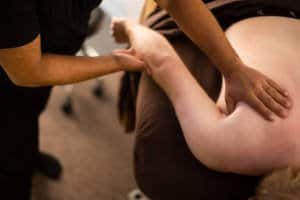Relieving Pain from A Pinched Nerve


The sensation can present as pain, tingling, numbness, loss of sensation, general discomfort, dull ache, radiating sensation down the arm or leg.
This nerve pressure can develop over time by poor posture or repetitive stress injuries from work. It can also occur while playing a sport, being active and moving the wrong way, or over lifting. Once the pressure has been relieved, the pain will generally go away. The pinched nerve will often relieve itself with rest over time. But in some cases, that can take a very long time. When suffering from pain and numbness, it can feel like a lifetime. There are some more conservative methods of healing that usually speed up the process, other than surgery. Reducing activity until healed is a must. Access your working environment, ergonomics, and repetitive strain to see why the compressed nerve may have occurred.
Options to Relieve Pain
Massage therapy may be a great option in relieving a pinched nerve because sometimes muscle tension may cause pressure. Often, massage therapy is the best treatment for pressing nerves in the hip-Piriformis muscles region. Piriformis pinches sciatica usually from sitting too much, carrying a wallet in one pocket, driving, hiking, even running. Or having hips misaligned, one foot longer than the other. Pregnancy can also cause pinched nerves from stretched tissues.

A physical therapist may prescribe mild cervical traction and mobilization, exercises, and other modalities to reduce pain in those cases. Regular gentle massage is recommended to reduce pain and tension in the surrounding muscles where the nerve is pinched and reduce the imbalance in the body from overcompensation in other muscles. If significant compression on the nerve exists to the extent that motor weakness results, surgery may be necessary to relieve the pressure.
Brilliant Massage & Skin
Burlington, Vermont


